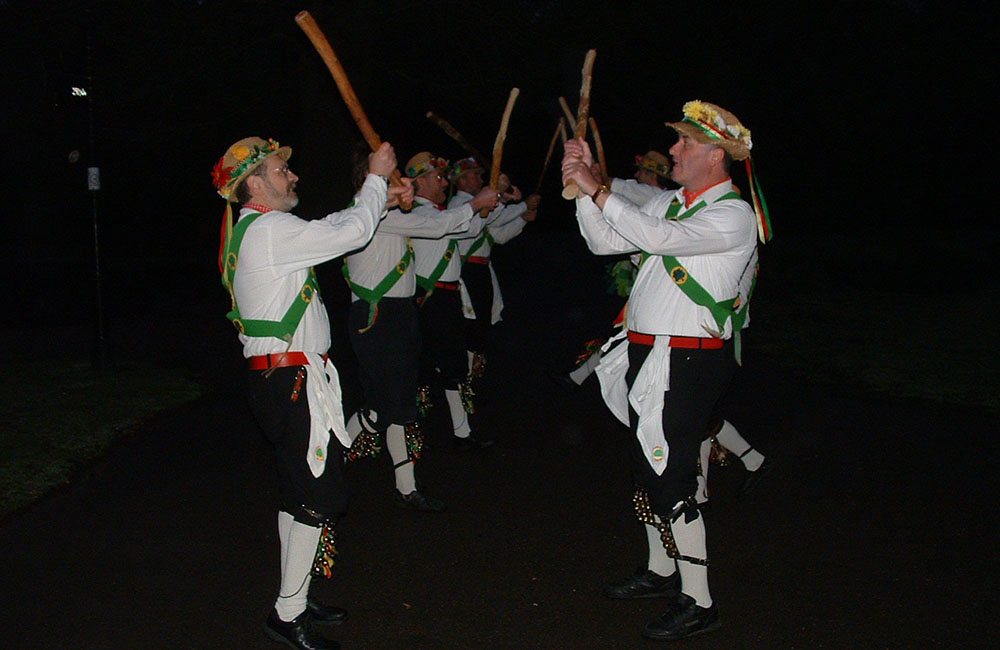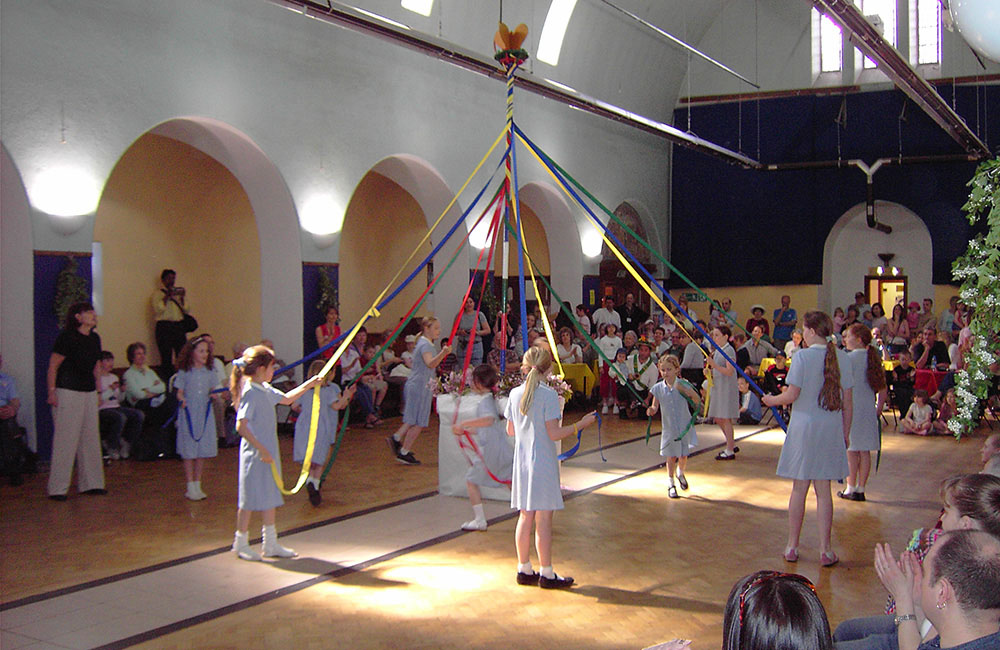All about the Morris Year
May Day - A Great English Tradition

1979 Dancing up the May Day Sun, Tim's Field, Sarratt
copyright 1979 Woodside Morris Men
The tendency then, is to overlook a festival that takes place just seven days later, which is a far more ancient celebration, and, in the way that the English celebrate it – all be it on the first Monday of the month, rather than the first day itself – it has become the quintessential celebration of our nation.
Morris dance has been associated with May festivals for hundreds of years, particularly Whitsun and May Day. In the 19 Century, church sponsored festivals would last a week, and were fore-runners of our current bank holidays. Morris dancing, especially in the counties of Oxfordshire, Northamptonshire, Warwickshire and Buckinghamshire, was closely associated with these events, with a village's Morris coming out to perform at the events.

2003 Dancing up the May Day Sun, Cassiobury Park, Watford
copyright 2003 Woodside Morris Men
Although local churches may have understood the need for a village's population to let off some steam at these events, during the Victorian era, there were some who frowned upon such activities, particularly with them being to closely linked to the church. The feasts or ales, as they were often called, could get a little wild, and on occasion, a little less godly than some may wish. This lead to the truncation of such events, and even prohibition, which has been cited by some as a reason for the death of pre-revival Morris dancing.
These days, with travel a little easier, and a nationwide network of Morris sides, the festivals generally tend to draw teams to big fetivals, such as the Rochester Sweeps Festival, the Hastings Jack in the Green Festival, the Chippenham Folk Festival, or the Cleethorpes Folk Festival which take place on the bank holiday weekends. But on May Day proper (1st May, that is), many local sides see it as a duty to set out early to greet the first dawn of the Summer; though on some May Day mornings, it's a little bit difficult to make out when the sun has actually risen!
It's not the Morris dancing alone that makes the celebration so English, but rather the multitude of May Day fetes, maypole dancing, and all round celebrations. They don't always take place on the day, or even the bank holiday weekend, but they all alude to the same thing: celebrations of the start of summer in a very English manner. We are proud that we play a part in it, be it greeting the dawn, dancing at a fete, or having a drink and a song out the front of a pub!.

2005 May Day Celebrations, Shenley Village Hall, Shenley
copyright 2005 Woodside Morris Men
These May Day celebrations in England, however, have parallels in countless other festivals held the world over. Since Man first realised the importance of the changing seasons, the start of Summer has been an occasion marked by some form of festival or honour, and links to the traditional customs of a community or nation are almost invariably marked in their celebration.
Ancient Britons celebrated Beltane at this time of year, which is now associated with the night of April 30 (the eve of May Day). Beltane marked the start of summer, a time of growth and fertility; its sister festival Samhain, marks the start of winter, and has more recently evolved into what we now know as Halloween.
May Poles, Morris Men, School Fetes, the list of English icons goes on, all of which have made our traditional May celebrations the archetypical English festival. Could it be that, rather than a genuine celebration of England and the English ideal, what those calling for an escalation in jingoism on 23 April really want is another excuse to go out and get lashed? And maybe I’ll join them, I am still a big fan of St George and his worthy deeds, but maybe I will then celebrate my Englishness when I’ve had a little time to recover; seven days in fact.
We could never suggest that May Day, or May festivals, are uniquely English, but the way we celebrate it, it does become a unique reflection of a wealth of English tradition, with a well defined history of celebration which St George's day cannot lay claim to.

1999 May Day Breakfast, Dave Reiley's, Rickmansworth
copyright 1999 Woodside Morris Men


